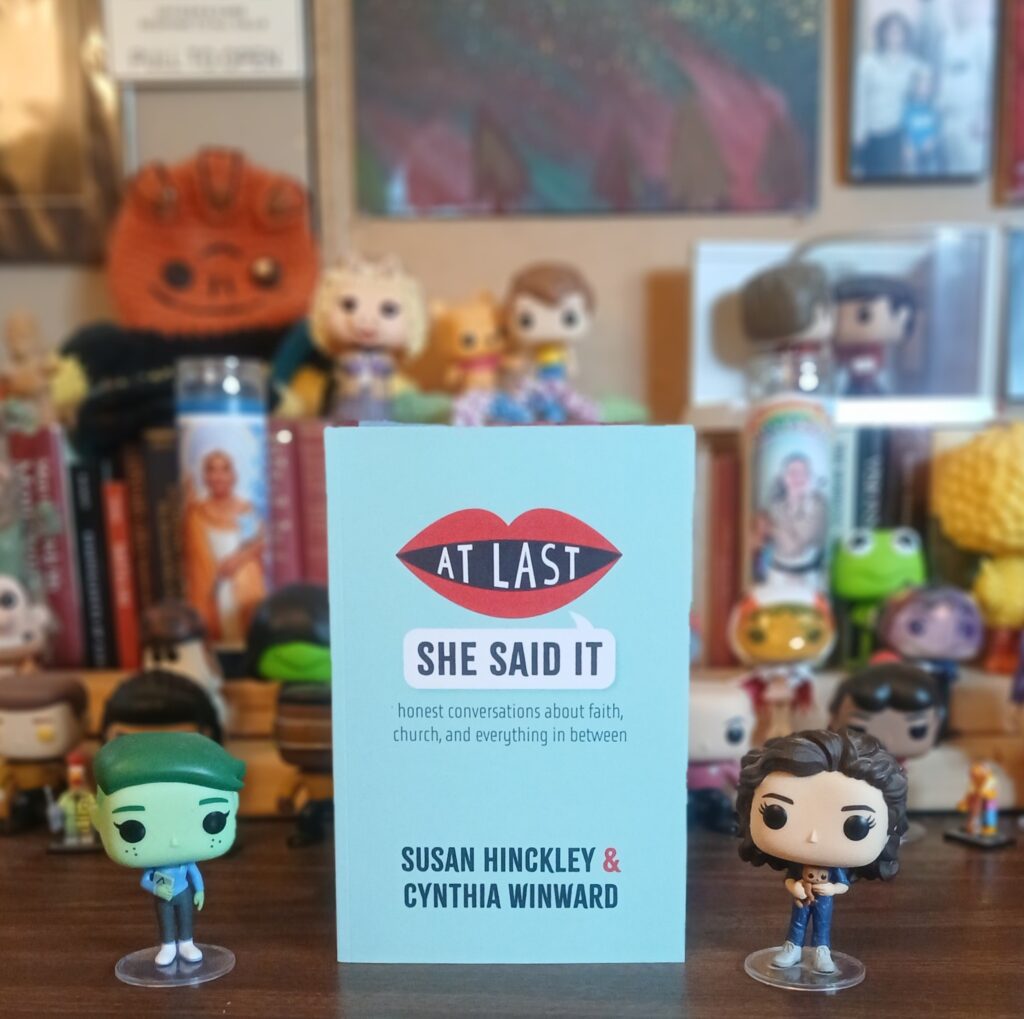Review
———
Title: At Last She Said It: Honest Conversations About Faith, Church, And Everything In Between
Authors: Susan Hinckley and Cynthia Winward
Publisher: Signature Books
Genre: Women’s Studies
Year Published: 2025
Pages: 255
Binding: Paper
ISBN: 978-1-56085-521-7
Cost (paperback): $24.95
Reviewed by Julie Nichols for the Association for Mormon Letters
The fourth of the five sections in At Last She Said It is called “It’s Complicated”—and “complicated” is perhaps the loudest, best descriptor for this book’s mission and theme. Hinckley and Winward started their “At Last She Said It” podcast in 2019. The podcast’s premise was that Hinckley’s and Winward’s shared experiences arrived at from different backgrounds and generations—their discomfort and dismay at the dissonance between what was said about women in the church and what actually happened and how women felt about it—were probably widely and deeply felt across the church’s female population. But they were rarely openly discussed, much less encouraged. For Hinckley and Winward to say “it” at last, to “amplify Latter-day Saint women’s voices” (vii) felt imperative. With the podcast’s enormous success, a book was inevitable.
Each of the four to six essays in each section (24 in all) could incite a raucously diverse discussion in a ward book group (or dare we hope for it, Relief Society lesson? Ah, reader, suggest such a thing at your peril). Topics from patriarchy to wearing pants to church and, as the subtitle says, “everything in between” are squarely faced. Final answers are far from forthcoming—that’s not the point of the book or the podcast. In fact, the point is more like “final answers don’t work for us. Let’s talk, with reason and compassion, instead.” As in the podcast, sometimes the voice is Hinckley’s, sometimes it’s Winward’s, liberally interspersed with wisdom gleaned from scripture and from spiritual thinkers in and out of the church. (Citations follow every section.)
The title of the book’s first section is “Dancing With the Patriarchy.” Four essays lay out clearly what girls and women don’t get in the church (the list on pp. 5-8 is verifiable and depressingly familiar, ending with “women don’t get to fix any of these inequalities”); why ordination is the least of the things women should (or do) worry about when they look at disparities in church organization; and the complex relationship between “hating patriarchy” and “loving the priesthood.” The final essay is “For the Men in the Room.” Like all the essays in this book, it asks hard questions: can LDS men acknowledge that the Church is a patriarchy? Can they be our allies? Like all the essays in this book, this one is uncomfortable and impossible to answer.
But like all the (mostly short, always smart) essays in the book, it’s juicy by way of being personal, specific, and emotionally and spiritually naked. Men, as well as women, will have complicated responses to the stories, facts, analyses, and hard truths offered here. The writing is clear, smart, and unafraid. The writers are active churchgoers, with family lines leading a long way back. But inequality also goes a long way back.
However, the book isn’t just about inequality. It’s also, quite simply, about complexity.
The second section’s title is “Outside the Box.” Hinckley’s essay in this section describing her search for “a larger God” is my personal favorite. As a non-Utah native, I have lots of friends with lots of different images of God, many of which/whom comfort and call to me in my many moments of need.
I imagine every reader of this book will find a personal favorite in one section or another. After the first two come sections called “What about…?”; “It’s Complicated”; and “Embracing Your Journey.” Why might a Mormon woman joyfully wear a cross around her neck even though supposedly “we don’t do crosses”? What about wearing pants to church? What about chafing under the handbook’s definition of “wrong,” or what about seeing nuance that male leaders and even women leaders and friends don’t seem to notice in such complicated concepts as worthiness, repentance, obedience, grieving, grace, or transformation?
Asking whether inequalities are necessary, helpful, Christlike, or “true”—wrestling with the complications a patriarchal institution calling itself all of the above imposes on intelligent, talented women—such wrestling could (and should, if only–!) raise the standard of Church governance and service for both men and women. This book joins a long line of such wrestling, in podcasts and print published within and without the Church. Hinckley and Winward deserve our thanks and study. Keep bringing it on—but reader, don’t expect it to be simple.

